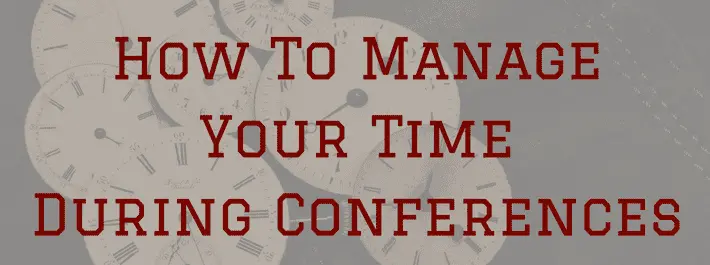
How to manage your time during conferences
Read a summary using the INOMICS AI tool
Conferences can be great career boosters and good fun to attend, but they can also be chaotic, rushed, and rather intimidating. If you are someone who struggles with time management, you may find the conference days difficult to navigate. To help with this, try these tips on managing you time during conferences:
- Print out a timetable
The key to organising your conference time is to plan out as much as possible in advance. Often, conference materials like timetables, abstracts, and more will be up on the conference website before the event itself. Take advantage of this to see what kind of events are being put on so that you can plan your time accordingly. It's helpful to have an electronic copy of the timetable on your phone or computer, but it's even better to have a paper copy so that you can scribble down notes on it or circle things you don't want to miss. Print out a copy of the timetable before you arrive at the conference to be totally prepared.
- Select key events
Another way to organise your time efficiently is to identify the talks, posters, or events that you absolutely don't want to miss. Select a small number of key events and highlight them on your timetable. You could also make a list of secondary events which you are interested in attending but which are not absolute essentials for you. Then, when you arrive at the conference, make sure that you pick up the conference brochure to check for last-minute changes to timing or location of those events. You can arrange your days around these few key events to make the conference as useful for you as possible.
- Remember to allow for travel time
When you're in a new city, however long you think it will take to travel somewhere, it will probably take longer! Remember that it'll take some time for you to find a bus stop, read the bus timetable, buy a ticket, get on the right bus, and then get off at the right stop, for example. Always give yourself extra time for travelling, especially if you're going to or from an area that you don't know. This counts for both travelling to the conference, and travelling around within the conference between sessions. Large conferences may be held over more than one building, and it might be a fifteen minute walk between locations – and that's without a crowd. To avoid stress and rushing, build some wiggle room into your travel times.
- Give yourself time to sleep,
With so much to do at a conference, it might be tempting to miss out on some sleep. After all, a few hours less sleeping is a few hours more you have for networking, attending lectures, and meeting new people. However, if you're exhausted at the conference then you won't learn anything. Conferences can be surprisingly tiring, from the physical exertion of walking around a big conference centre to the mental effort of being professional and “on form” all day long. Do yourself a favour and give yourself enough time to get at least eight hours of sleep a night so you can be at your best.
- For a longer conference, take a few hours off for breakfast or finish early one day
If you're going to a longer conference – say, one which is three to five days or longer – then you'll probably need a break at some point. Even if you're very interested and engaged in the conference, it's difficult to maintain focus over many days when you're in a new and busy environment. So plan to take off a few hours for yourself to relax. You could take a morning off the conference to eat a leisurely breakfast and rejoin the event before lunch, or you could nip off a couple of hours early one afternoon to wander around the city. Taking a few hours to yourself will help you to engage fully with other attendees for the rest of the conference time.
Top Blog Posts to Read:
-
- Conference
- Posted 1 week ago
International Conference Environmental Engineering (ICEE 2026)
Between 23 Apr and 25 Apr in Vilnius, Lithuania
-
- Conference
- Posted 2 months ago
The AI & Automation Conference 2026: Smarter, Safer, More Scalable AI for the Modern Enterprise
Between 25 Feb and 25 Feb in London, United Kingdom












